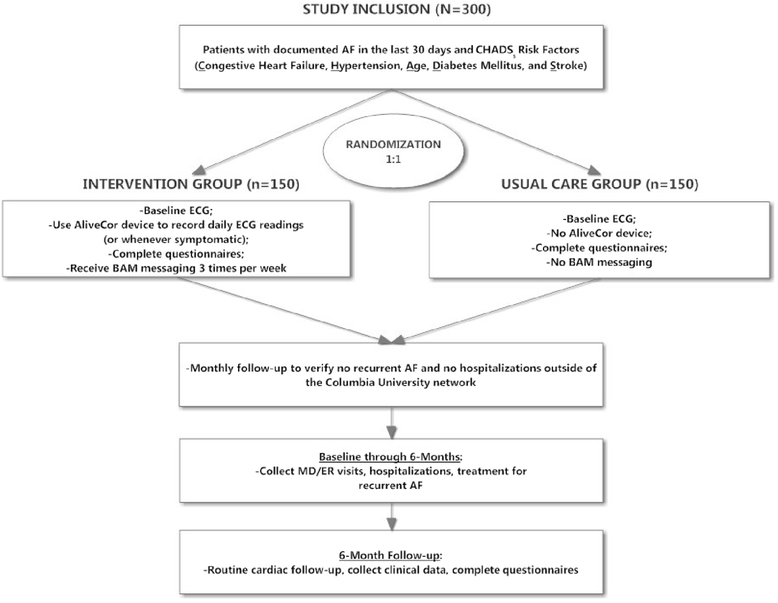A single-center randomized, controlled trial investigating the efficacy of a mHealth ECG technology intervention to improve the detection of atrial fibrillation: the iHEART study protocol
- PMID: 27422639
- PMCID: PMC4947299
- DOI: 10.1186/s12872-016-0327-y
A single-center randomized, controlled trial investigating the efficacy of a mHealth ECG technology intervention to improve the detection of atrial fibrillation: the iHEART study protocol
Abstract
Background: Atrial fibrillation is a major public health problem and is the most common cardiac arrhythmia, affecting an estimated 2.7 million Americans. The true prevalence of atrial fibrillation is likely underestimated because episodes are often sporadic; therefore, it is challenging to detect and record an occurrence in a "real world" setting. To date, mobile health tools that promote earlier detection and treatment of atrial fibrillation and improvement in self-management behaviors and knowledge have not been evaluated. This study will be the first to address the epidemic problem of atrial fibrillation with a novel approach utilizing advancements in mobile health electrocardiogram technology to empower patients to actively engage in their healthcare and to evaluate impact on quality of life and quality-adjusted life years. Furthermore, sending a daily electrocardiogram transmission, coupled with receiving educational and motivational text messages aimed at promoting self-management and a healthy lifestyle may improve the management of chronic cardiovascular conditions (e.g., hypertension, diabetes, heart failure, etc.). Therefore, we are currently conducting a randomized controlled trial to assess the efficacy of a mobile health intervention, iPhone® Helping Evaluate Atrial fibrillation Rhythm through Technology (iHEART) versus usual cardiac care.
Methods: The iHEART study is a single center, prospective, randomized controlled trial. A total of 300 participants with a recent history of atrial fibrillation will be enrolled. Participants will be randomized 1:1 to receive the iHEART intervention, receiving an iPhone® equipped with an AliveCor® Mobile ECG and accompanying Kardia application and behavioral altering motivational text messages or usual cardiac care for 6 months.
Discussion: This will be the first study to investigate the utility of a mobile health intervention in a "real world" setting. We will evaluate the ability of the iHEART intervention to improve the detection and treatment of recurrent atrial fibrillation and assess the intervention's impact on improving clinical outcomes, quality of life, quality-adjusted life-years and disease-specific knowledge.
Trial registration: NCT02731326 ; Verified April 2016.
Keywords: Atrial fibrillation; Electrocardiogram; Mobile health; Quality of life; Quality-adjusted life years; Self-management; Smartphone.
Figures
References
-
- Fuster V, et al. 2011 ACCF/AHA/HRS focused updates incorporated into the ACC/AHA/ESC 2006 Guidelines for the management of patients with atrial fibrillation: a report of the American College of Cardiology Foundation/American Heart Association Task Force on Practice Guidelines developed in partnership with the European Society of Cardiology and in collaboration with the European Heart Rhythm Association and the Heart Rhythm Society. J Am Coll Cardiol. 2011;57(11):e101–98. doi: 10.1016/j.jacc.2010.09.013. - DOI - PubMed
Publication types
MeSH terms
Associated data
Grants and funding
LinkOut - more resources
Full Text Sources
Other Literature Sources
Medical
Miscellaneous



